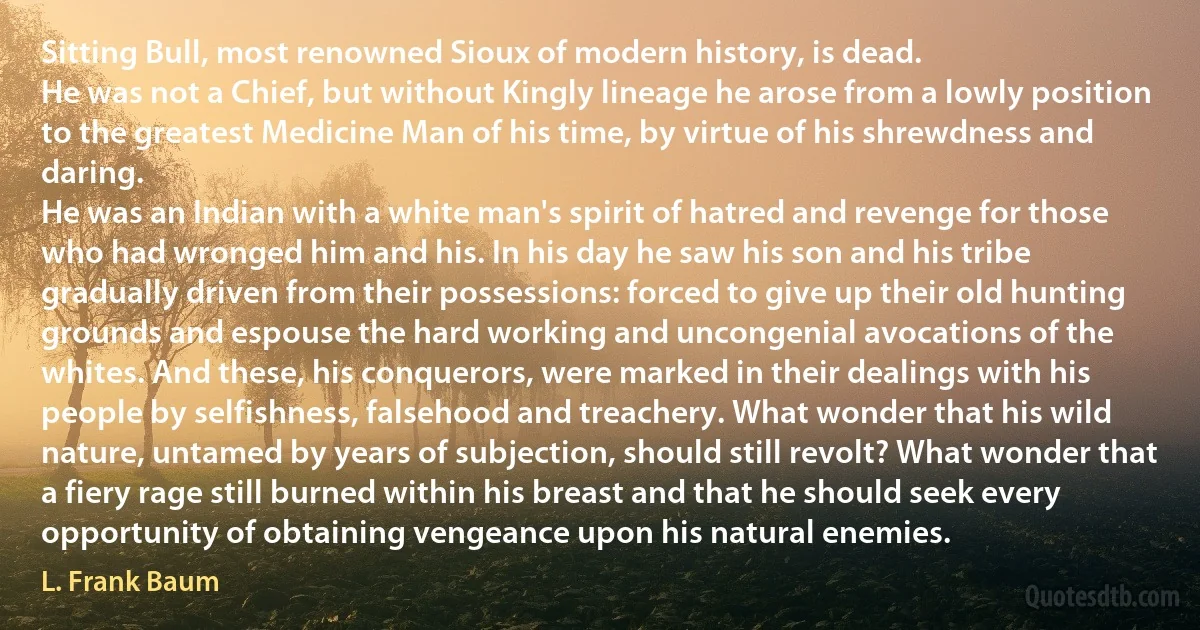
Sitting Bull, most renowned Sioux of modern history, is dead. He was not a Chief, but without Kingly lineage he arose from a lowly position to the greatest Medicine Man of his time, by virtue of his shrewdness and daring. He was an Indian with a white man's spirit of hatred and revenge for those who had wronged him and his. In his day he saw his son and his tribe gradually driven from their possessions: forced to give up their old hunting grounds and espouse the hard working and uncongenial avocations of the whites. And these, his conquerors, were marked in their dealings with his people by selfishness, falsehood and treachery. What wonder that his wild nature, untamed by years of subjection, should still revolt? What wonder that a fiery rage still burned within his breast and that he should seek every opportunity of obtaining vengeance upon his natural enemies.
L. Frank BaumRelated topics
breast bull chief day dead drive falsehood hard hatred history hunting lineage man medicine natural nature opportunity people position revenge revolt saw seek selfishness should sioux sitting son spirit subjection time treachery vengeance virtue white wild wonder working shrewdness dealings yearsRelated quotes
If Christ were to walk in this world today, do you know what would happen to Him? He would be placed in a mental institution and given psycho-therapy, just as would His Saints. The world would crucify Him today just as it did 2000 years ago, for the world has not learned a thing, except more devious forms of hypocrisy. And what would happen if, in one of my classes at the university, I would one day tell my students that all the learning of this world is of no importance beside the duty of worshipping God, accepting the God-man who died for our sins, and preparing for the life of the world to come? They would probably laugh at me, and the university officials, if they found out, would fire me-for it is against the law to preach the Truth in our universities. We say that we live in a Christian society, but we do not: we live in a society.

Seraphim Rose
[the foreign Muslims (or Turks)] "alone are capable of virtue, kindness, generosity, valour, good deed, good works, truthfulness, keeping of promises... loyalty, clarity of vision, justice, equity, recognition of rights, gratitude for favours and fear of God. They are, consequently, said to be noble, free born, virtuous, religious, of high pedigree and pure birth. These groups, alone are worthy of offices and posts in the government... Owing to their actions the government of the king is strengthened and adorned.” [On the other hand the] "low-born” (Indian) Muslims are capable only of vices - immodesty, falsehood, miserliness, misappropriation, wrongfulness, lies, evil-speaking ingratitude,...shamelessness, impundence... [So they are called] low-born, bazaar people, base, mean, worthless, plebian, shameless and of dirty birth”.

Ziauddin Barani
With... small-town life... there are hundreds of thousands... who are not content. The more intelligent young people... flee to the cities... and... stay there, seldom returning even for holidays. The reason, Carol insisted... is an unimaginatively standardized background, a sluggishness of speech and manners, a rigid ruling of the spirit by the desire to appear respectable. It is contentment... the contentment of the quiet dead, who are scornful of the living for their restless walking. It is the prohibition of happiness. It is the slavery self-sought and self-defended. It is dullness made God. A savorless people, gulping tasteless food and sitting afterward, coatless and thoughtless, in rocking-chairs prickly with inane decorations, listening to mechanical music, saying mechanical things about the excellence of Ford automobiles, and viewing themselves as the greatest race in the world.

Sinclair Lewis
On September 16, 1978, there was an eclipse of the moon in Riyadh. Late one afternoon it became visible: a dark shadow moving slowly across the face of the pale moon in the darkening blue sky. There was a frantic knocking on the door. When I opened it, our neighbor asked if we were safe. He said it was the Day of Judgement, when the Quran says the sun will rise from the west and the seas will flood, when all the dead will rise and Allah's angels will weigh our sins and virtue, expediting the good to Paradise and the bad to Hell. Though it was barely twilight, the muezzin suddenly called for prayer--not one mosque calling carefully after another, as they usually did, but all the mosques clamoring all at once, all over the city. There was shouting across the neighborhood. When I looked outside I saw people praying in the street.

Ayaan Hirsi Ali
Development means a capacity for self-sustaining growth. It means that an economy must register advances which in turn will promote further progress. The loss of industry and skill in Africa was extremely small, if we measure it from the viewpoint of modern scientific achievements or even by standards of England in the late eighteenth century. However, it must be borne in mind that to be held back at one stage means that it is impossible to go on to a further stage. When a person was forced to leave school after only two years of primary school education, it is no reflection on him that he is academically and intellectually less developed than someone who had the opportunity to be schooled right through to university level. What Africa experienced in the early centuries of trade was precisely a loss of development opportunity, and this is of the greatest importance.

Walter Rodney
